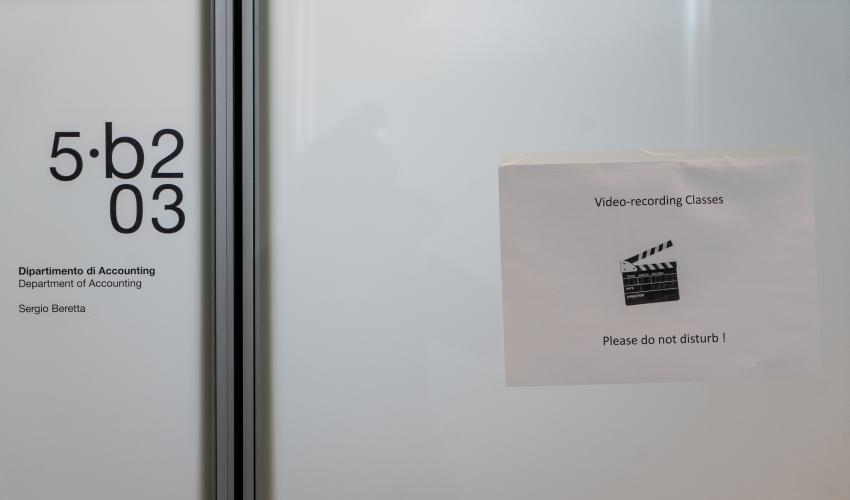
When Your Classroom Becomes the Screen. Faculty Relate Their Experiences, Part 1
BY SWITCHING TO DISTANCE LEARNING, BOCCONI WAS CAPABLE OF MAINTAINING THE FLOW OF LEARNING BETWEEN FACULTY AND STUDENTS. HERE ARE THE STORIES OF 22 PROFESSORS INVOLVEDCoronavirus blocked on-campus teaching and seminar activities, but not courses, which resumed a few hours after Milan and Lombardy where hit by the epidemic. The adaptation had a positive side, as these experiences testify.
Antonella Carù, Experiential Marketing: "I find the determination and broadmindedness with which Bocconi faculty has dealt with this challenge extraordinary. Many colleagues, starting from myself, are experimenting with teaching tools that they would not have not perhaps otherwise tried. During this week, colleagues often shared what they had done in-class teaching into full-fledged distance learning! And I was very impressed by the responsiveness and positive reaction of the students, for example in carrying out an unforeseen assignment well, and by the companies' willingness to keep their projects with us going. A sign of how we are all rising to the challenge!".
Charles Williams, Corporate Strategy: “I started to create a new mix of contents for our online platform. I also worked to create introductions to each module: I shot a video in front of Whirlpool's headquarters, and another together with my son while he was playing Pokemon GO. So some parts were actually fun, even if delivering short lectures in my dining room in front of the computer is much less engaging for me than being in before a classroom full of students!”.
Hannes Wagner, Corporate Finance: "Bocconi has been preparing for years for situations like this, through its constant updating of its teaching technologies. For example, today we regularly use powerful cloud services for teaching, which if necessary are also able to provide live and recorded video sessions to hundreds of students. Online teaching is a great way to reconnect everyone and create the high quality learning community we are used to. "
Gaia Rubera and Paola Cillo, Innovation and Marketing Analytics: "We did two online lessons and students all logged on at the same time and we were amazed to see that their number was exactly the same as in the physical classroom. For another lesson we recorded a 15-minute video so that the kids could follow the lesson at whatever time was most appropriate for them. Splitting 90-minute lessons into much shorter blocks was very useful, because it made you think better about the contents of the course. This new experience is going very well and the students have responded very positively. We are making a signifcant effort to create some new material that works better for this form of teaching. "
Paolo Morosetti and Guido Corbetta, Performance Management and Corporate Strategy: "Videos have been made available to present notions of theory, as well as discuss case histories which in our field are extremely important to train the managerial class of the future. Discussion forums were then activated for a continuous interplay between faculty and students and between students themselves. Online teaching is not a new tool, for over 15 years the University has been using advanced e-learning platforms. The accumulation of experience has helped us act promptly today. We have to look at everything as an opportunity to innovate."
Giunia Gatta, Political Philosophy: "In the first lesson in distance learning mode, participation was passionate, with many quality interventions. The students intervened both via chat and by virtually raising their hands; so save for the awkwardness of the first few minutes, everything took place regularly. In the lesson we discussed Machiavelli and some of his writings which explain how to deal with difficult predicaments. Machiavelli's topical words, and resemblance to the historical moment we are experiencing, made the online class particularly engaging ".
Giuseppe Stabilini, Supply chain management (MBA): "Online teaching is certainly different from that in the classroom, but if it takes place live, you can maintain many of the characteristics of traditional teaching. One aspect, however, is very different, and in a positive way. Thanks to the sharing of the blackboard (whiteboard), all students can create, in a collaborative and simultaneous way, a logical path, an analysis, a comparison by writing directly on the blackboard ".
Anna Uslenghi, XXXX: "I streamed the lessongs from home and I can't deny that, when there is technology involved, you have the feeling of never having total control of the situation. But last year I had problems with my voice for a rather long period and, basically, it is the same thing, anything can happen at any moment. Two aspects seemed important to me: first, the clear impression that students are very committed to being active players in this experience and, secondly, the great, spontaneous and valuable collaboration occurring between academic colleagues. A really good collective test."
Andrea Colli, Business History: "I adapted a social media tool I already used, Instagram, to the current situation. In the previous weeks, my use of Instagram in the Business History course was limited to Stories that laied out some aspects of future in class discussion. The suspension of classes ha made me use new methods, including the creation of short videos on IGTV. A personal note: my three teenage daughters were indispensable in the training for using this tool. They patiently suggested moves aimed at increasing the medium's communicative impact ".
Stefania Saviolo, Management of fashion and luxury companies: "The experience in 2014 of creating the MOOC course on Fashion in the Coursera platform was of great help. Short videos (10-15 min) supported by ppt presentations, references to short articles , videos on YouTube, a series of questions that I answer in the next video. Students seem to appreciate it for now! In addition, the recorded lessons facilitate international students who want to continue following from their country. "
by Andrea Celauro
Translated by Alex Foti
